ACT and SAT prep apps can help you fit exam studying into your busy schedule. The ACT and SAT can play an essential role in your college journey.

Your scores on these college entrance tests may influence whether you get admitted to your preferred school, earn a spot in an honors society, and qualify for merit-based scholarships and other financial aid.
With so much on the line, investing quality time in exam preparation can be a strategic choice. ACT and SAT apps can make studying convenient and easy and can help you understand the differences between AP exams vs. SAT subject tests, setting you up for success on test day.
10 Best ACT and SAT Prep Apps

ACT and SAT prep apps are mobile applications that help you learn key concepts and vocabulary that you’ll likely encounter while taking your exam.
Many apps include guides and video lessons covering critical reading, math, science, and writing concepts. For instance, you may use an app to learn new literary terms and review your knowledge of fractions. Effective test prep apps often include practice questions modeled after actual exams.
Completing these questions can help you expand your vocabulary, gain math proficiency, and strengthen your knowledge of core topics. Some ACT and SAT prep apps also feature diagnostic tests. These practice exams help you detect gaps in your knowledge. You can then concentrate on these areas when studying to increase your exam readiness.
Many developers and education companies have created innovative ACT apps and SAT apps. These tools can make exam preparation accessible, affordable, and even enjoyable. Here are the ten best ACT and SAT apps on the market today.
ACT Practice Flashcards
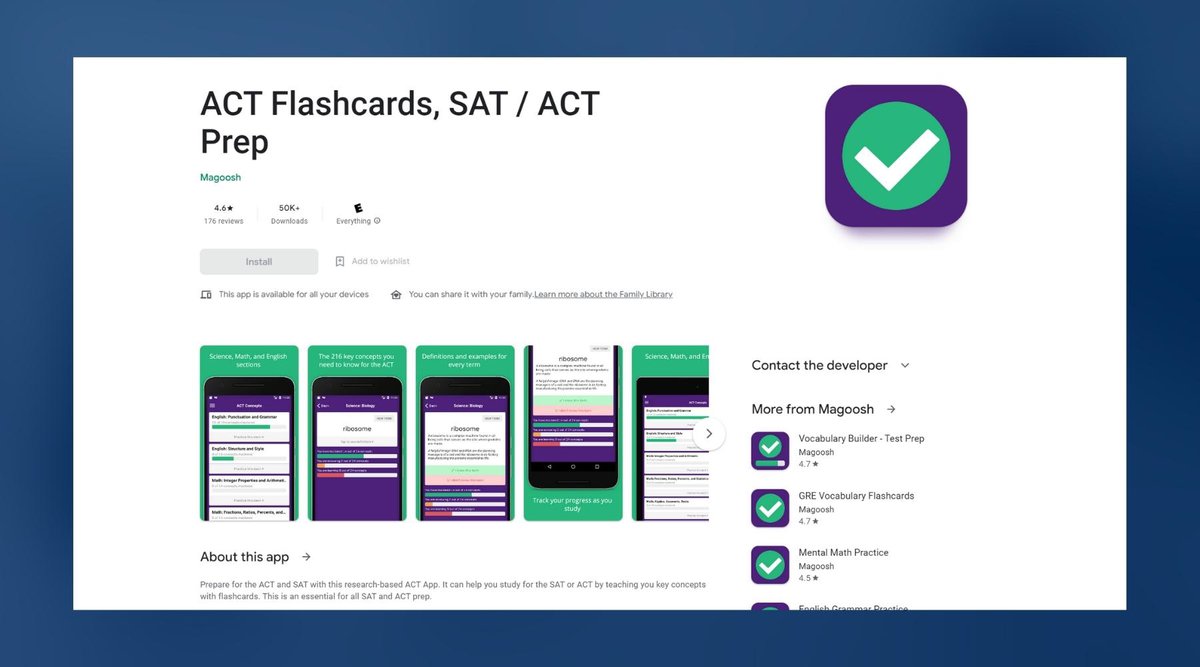
Developer: Magoosh
Download: App Store, Google Play
This free ACT prep app includes flashcards covering over 200 key topics and vocabulary terms. You can study concepts from three areas: English, math, and science.
The app divides these three subjects into smaller flashcard decks centered on key ideas. For example, the English flashcard decks include grammar rules and definitions, punctuation, structure, and style. This valuable feature lets you focus on the areas where you need the most help.
The app also includes progress bars that measure your mastery of each deck. This feature can motivate you to study challenging concepts to complete all the bars.
Khan Academy
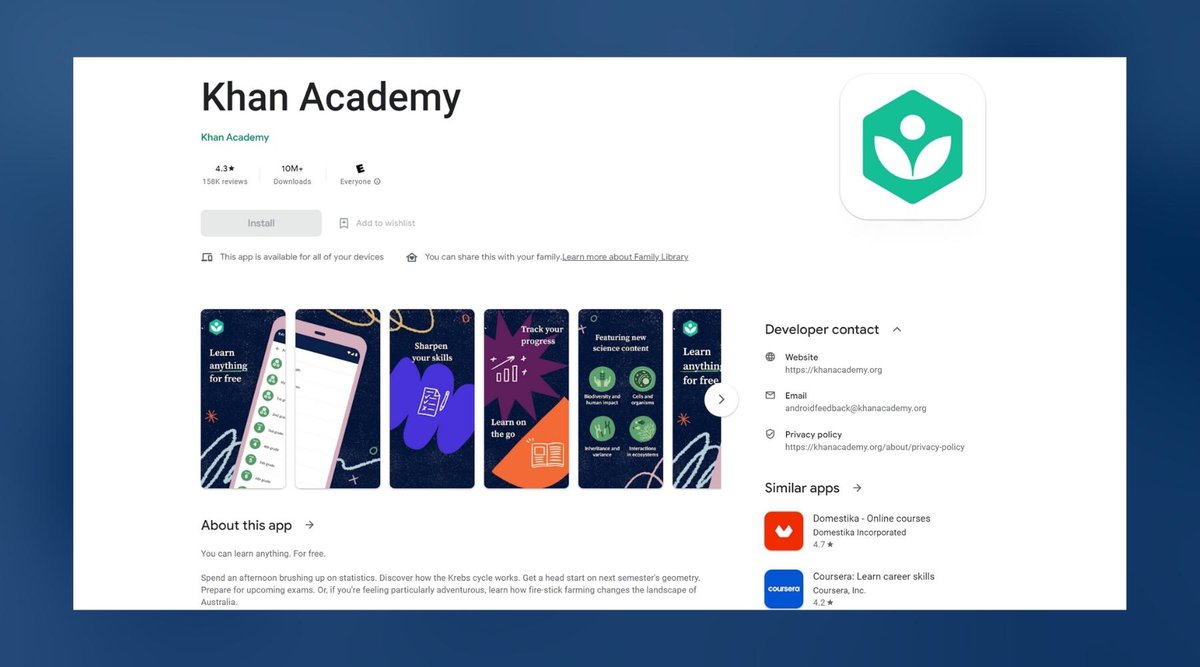
Developer: Khan Academy
Download: App Store, Google Play
You can use this free app to study for the ACT and SAT. The app features thousands of interactive, expert-created lessons and videos about vital concepts on these tests, like grammar and math.
The application also includes quizzes and tests that you can use to sharpen your understanding of these topics. You’ll receive immediate feedback about your answers as you complete the exercises. Khan Academy’s biggest strength is its vast variety of topics. You can keep using this versatile app after you take the ACT or SAT to learn about everything from art history to zoology.
Math Brain Booster Games

Developer: Kirill Dyakonov
Download: App Store Only
The Math Brian Booster Games app may help you ace the math portions of the ACT and SAT. Designed for Apple devices, this app enables you to complete challenging math problems in customized sessions that develop your attention, critical thinking, and memory.
You can also correct all your errors in a “mistakes workout,” which helps you identify and fix problem areas. Math Brain Booster Games teaches you strategies to quickly make calculations and solve formulas without using a calculator. Using this app is a fun, customizable way to hone your math skills before test day.
Ready4 SAT
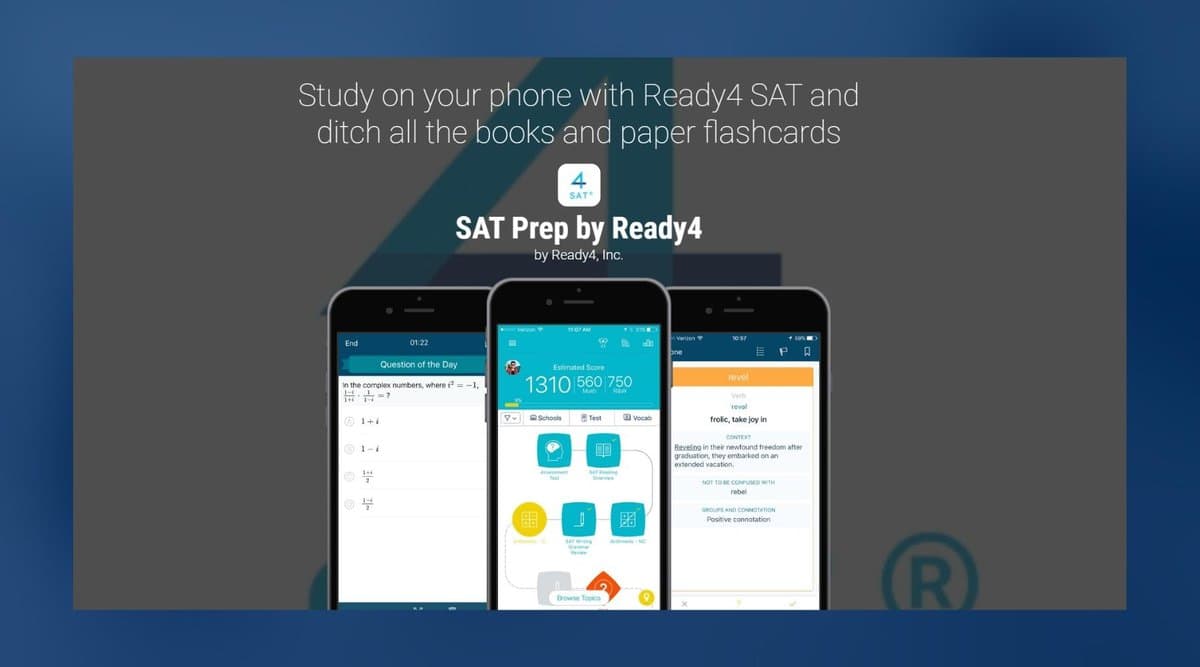
Developer: Ready4, Inc.
Download: App Store, Google Play
The Ready4 SAT practice app offers users several ways to prepare for the SAT exam. The app features hundreds of flashcards that you can use to learn and review important concepts. It also includes over 1,000 sample questions based on the real exam.
As you study the flashcards and answer the practice problems, the app measures your level of preparation for the SAT. The app also lets you view the average SAT score for over 400 colleges. This feature can help you set goals for the exam and get a sense of how you stack up to previously admitted students.
SAT Flashcards: Prep & Vocab
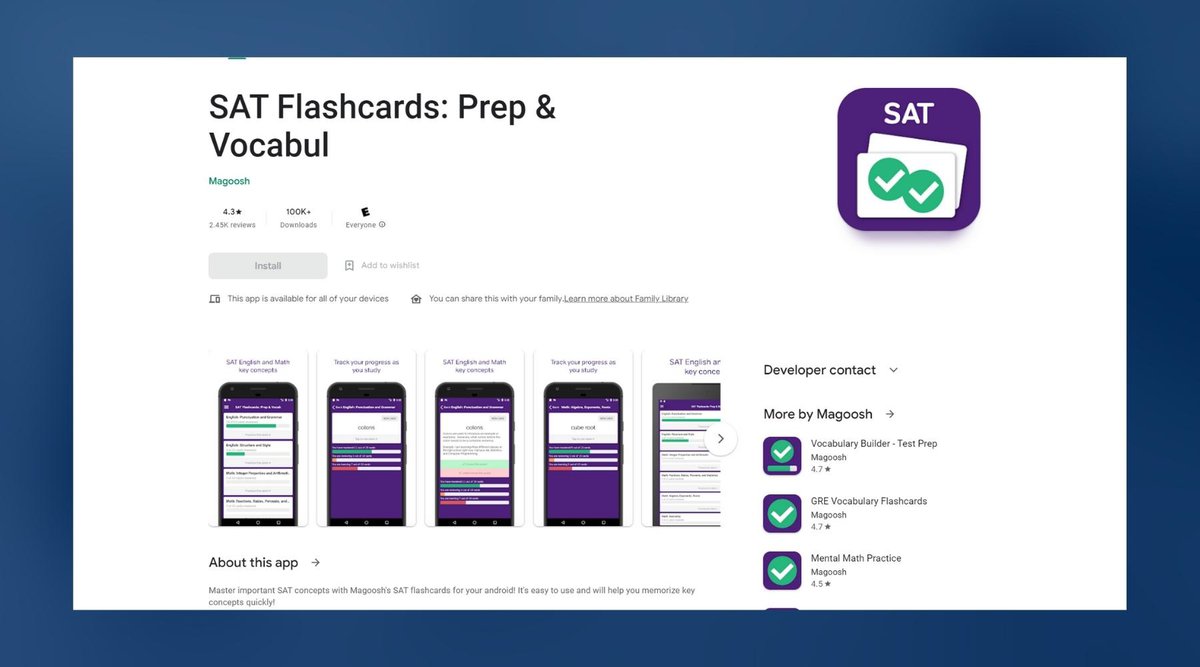
Developer: Magoosh
Download: App Store, Google Play
This free app helps you study for the English and math portions of the SAT. The flashcards include over 350 vocabulary words that may appear on the exam.
You can view each term’s definition and read example sentences, allowing you to memorize the words quickly. These flashcards can also be used to study math concepts like geometry and trigonometry. The SAT Flashcards app organizes concepts into themed decks.
Each deck has a mastery bar that calculates your progress as you learn, review, and master the ideas. Flashcards you don’t know reappear later in the session for extra practice.
SAT Exam Prep & Practice
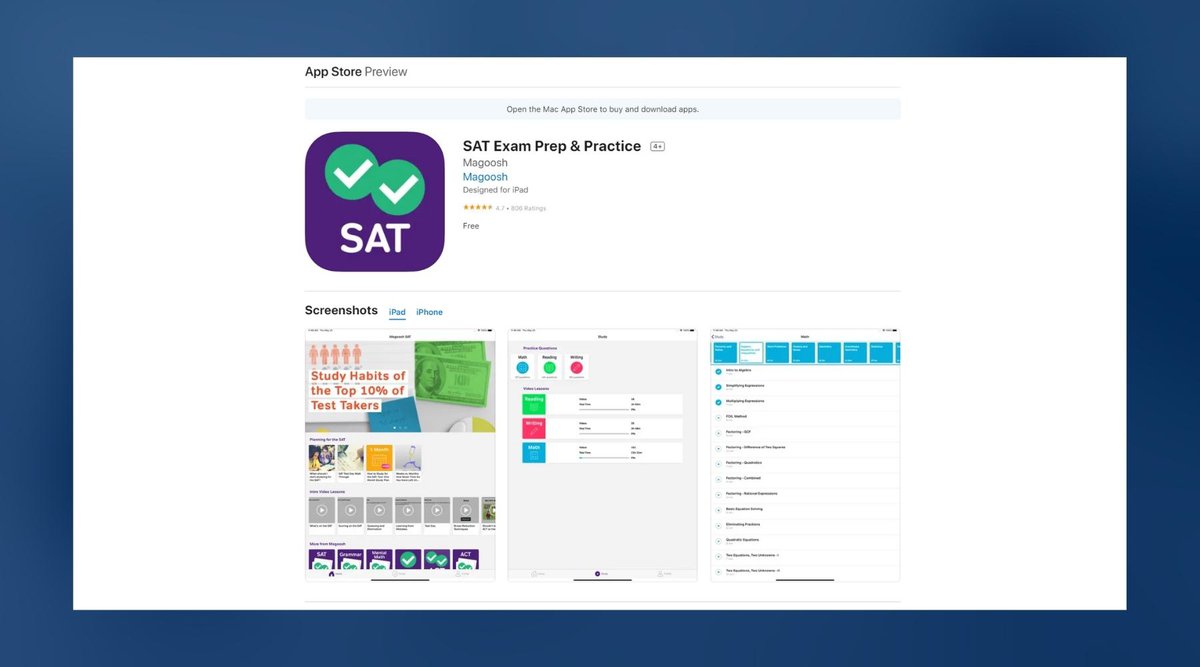
Developer: Magoosh
Download: App Store, Google Play
This app has practice questions that help you prepare for the SAT exam. You can answer questions related to math, reading, and writing. Trial users have access to 54 free questions, but you must upgrade to a premium account to access the app’s full bank of over 400 practice questions.
The app provides text and videos to explain the correct solutions for every question. You can also watch video lessons to learn about key ideas like the order of operations and writing skills. This app could be a helpful study aid if you learn best by viewing videos.
SAT Exam Prep Practice Test
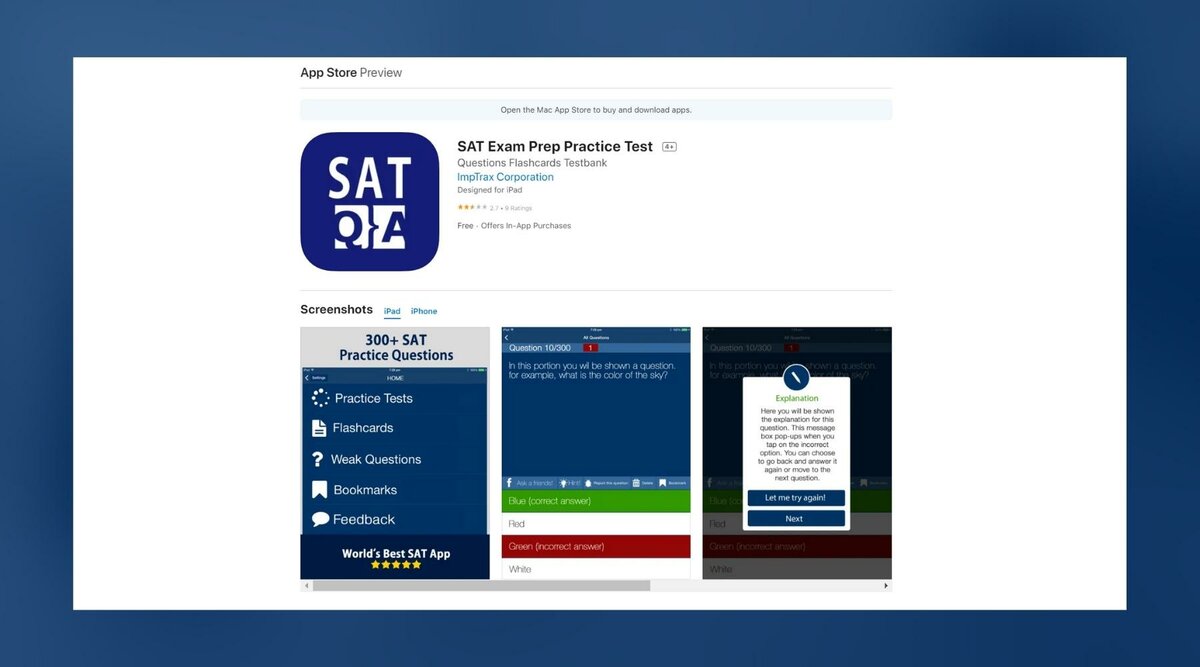
Developer: ImpTrax Corporation
Download: App Store Only
This SAT practice app offers over 300 questions. You can use the tool in two study modes: Flashcard and Practice Test. For example, you can first review the 300 concepts as flashcards and then double-check your understanding with practice questions.
The tool provides thorough explanations for each question. You can review and retake your weakest questions for extra studying. The app also includes an intelligent progress card that measures your exam readiness. The wide range of practice questions and the weakest questions feature can make this app a useful supplement for SAT exam preparation.
SAT: Practice, Prep, Flashcards
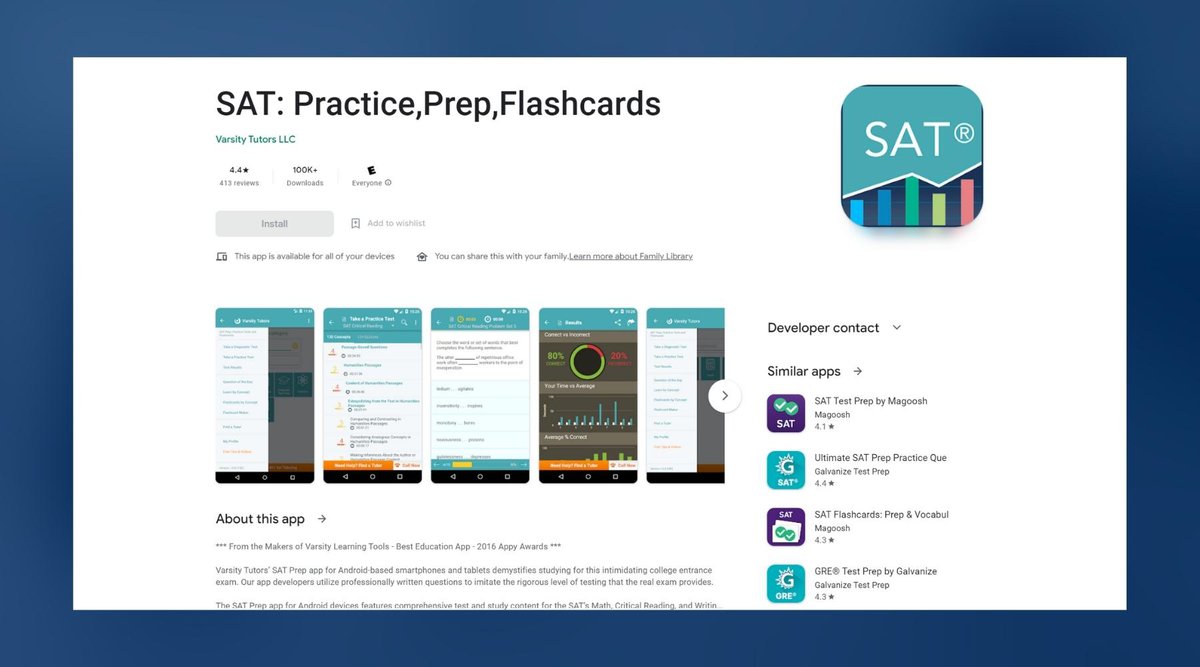
Developer: Varsity Tutors
Download: App Store, Google Play
This award-winning application can help you get ready for the SAT writing portions. The versatile tool gives you a variety of ways to study. If you only have a few minutes, you can answer the question of the day.
During longer study sessions, you can take diagnostic and practice tests, learn concepts, and create your own flashcards or study premade ones. The app has a sleek, user-friendly interface that makes studying easy and stress-free. It provides stylish graphs to measure your progress. If you need extra help, the app can connect you with an exam expert at Varsity Tutors.
SAT Vocab

Developer: Mindsnacks
Download: App Store Only
The SAT Vocab app makes studying vocabulary fun and motivating. The application has nine games to help you boost your vocabulary and learn key concepts like antonyms and spelling.
The app offers one free game, but you’ll need to upgrade to the premium version to access all 25 lessons. This tool provides an enjoyable alternative to studying flashcards. The games can motivate you to practice your vocabulary to improve your score. If you want to prepare for the SAT without feeling like you’re studying, SAT Vocab could be a strategic choice.
Vocab Genius

Developer: Brainscape
Download: App Store Only
The Vocab Genius app uses cognitive science methods to teach advanced vocabulary. You can use flashcards to learn over 800 vocabulary words.
The app also includes over 300 flashcards that teach common prefixes and suffixes. These flashcards teach you how to decipher new terms based on their structure, so you won’t be caught off guard by unfamiliar words during the ACT or SAT exam.
It also uses a customized algorithm that adapts to your strengths and weaknesses, allowing you to study more efficiently. If you want to elevate your vocabulary, Vocab Genius may be the right choice for you.
How to Use SAT Prep Apps

An SAT prep app can familiarize you with the exam format and may improve your test score. However, studying effectively requires more than just downloading an app and using it a few times before exam day.
These simple strategies can help you get the most out of your SAT practice apps:
- Choose an app with challenging questions. If you can answer most of the practice quizzes easily, you likely need to upgrade to an app with a higher difficulty level.
- Download multiple apps to get access to a rich assortment of practice questions. Many apps combine real questions from previous versions of the SAT and original questions. Using more than one app can expand your knowledge and prepare you to answer many types of questions.
- Expand your study sessions by researching test-taking strategies. SAT prep books, classes, and tutors can build on apps by helping you learn practical methods for completing questions as accurately and quickly as possible.
- Practice in frequent, short bursts. You can use your SAT apps whenever you have a few spare moments to study. Even five minutes of daily studying on the bus, between classes, or while watching TV can help you master English and math concepts.
- Select apps that play to your learning strengths. For example, an auditory learner can choose a tool with video lessons, while a visual learner may study best with an app that turns practice problems into a game.
- Take advantage of supplemental materials included in the app, such as textual explanations and video lessons. These tools can cement your understanding of complex concepts.
- Use your SAT practice app alongside prep books and courses. These learning tools can provide more thorough lessons about challenging topics. Books and classes also often include full-length practice exams that you can use to simulate an actual exam.
By strategically using SAT practice apps, you can maximize your study sessions and increase your likelihood of earning a desirable score.
What’s a Good SAT App?

The best SAT prep apps can equip you with the knowledge and skills you need to answer questions correctly and rapidly. Selecting an app with these features can enhance your studying:
- Ample practice questions modeled after the actual SAT exam
- Detailed explanations for every answer
- Diagnostic exams or quizzes
- Diverse ways to study
- Expert lessons that help you thoroughly understand the content
- Increasing levels of difficulty so that the app evolves with you as you learn
- Organized flashcards and questions that allow you to focus your studying on areas where you need improvement
- Performance tracking tools that help you evaluate your growth
- Responsive support from the app developer if you run into any glitches or errors
- Scores or other game-like properties that motivate you to study
- Simple interface that you can navigate smoothly
Keeping an eye out for these helpful characteristics can help you choose the best app for SAT prep.
Preparing for SAT and ACT Tests

The ACT and SAT are high-stakes exams. While some colleges and universities no longer require students to submit ACT or SAT scores during the application process, many schools still use these exams to make decisions about admissions and financial aid packages.
SAT and ACT prep apps can help you ace these essential exams by making studying effortless and fun. You can use the tools to brush up on your English and math skills during your free time. As you prepare for your test, you can jumpstart your educational journey by exploring accredited universities.
